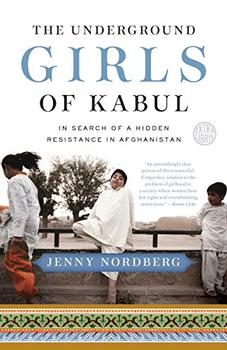Page 1 of 1
There are currently 5 reader reviews for The Underground Girls of Kabul
Write your own review!
reene s
Underground Girls of Kabul
My book club will be discussing this book this month on my recommendation. The research for the book was thorough and required as we know so little about the customs of a country we are so involved with. I had no idea that this custom was so common place. Since it appears that we will be involved in Afghan politics for a long time to come, I believe this should be required reading for high school students.
reene s
Underground Girls of Kabul
Written and well researched by investigative reporter Jenny Nordberg, it reads like a novel. You cannot but help to become involved in the lives of the "characters" Azita, Zahra, Shukria and Nadar. In a culture ruled by men, how do some women survive? The book is the story of the hidden custom called Bacha Posh; a custom that will both amaze and shock the reader. In a patriarchal society the birth of a son is a celebration; the birth of a daughter is a hardship. Without a son the family is disgraced and often shunned. A mother who cannot produce a son is considered guilty of not trying. It therefore becomes necessary to produce a son by any means possible.
This book will be a powerful, thought provoking learning experience for most readers.
Gloria
Read this book!
What kind of society values sons so highly that desperate women dress their daughters in pants and raise them as boys? And what happens to those daughters when they reach puberty and suddenly have to live as women in a society that demands that they be clothed from head to foot and never appear in public unless accompanied by a male family member?
Jenny Nordberg explores these questions in her thought-provoking book, “The Underground Girls of Kabul: In Search of a Hidden Resistance in Afghanistan.”
Nordberg introduces us to these “bacha posh,” women who live or have lived as men, and we discover that this practice is not specific to Afghanistan or Islam or even to the 21st century. The reasons for bacha posh are cultural, religious and financial, an offshoot of a patrilineal society in which a woman’s sole purpose is to bear a son.
I could hardly put Nordberg’s book down. It is, above all, enlightening. And at other times depressing and infuriating. “The Underground Girls of Kabul” shows how women are oppressed in one of the most war-torn countries in the world, but it also reveals how many women in Afghanistan are trying to push back against the oppression and find freedom for themselves and their daughters.
SJ2B House of Books
Highly recommended
'The Underground Girls of Kabul' by Jenny Nordberg is an immensely informative, insightful and compelling read. Nordberg obviously did extensive research on the practice in Afghanistan of 'basha posh'. I was not aware of the practice but not surprised.
Having lived in the Middle East I can appreciate a little of the difficulties muslim women face daily living in this often oppressive, male dominated environment. A woman's life outside the home is practically impossible without a male family member to escort them and I understand the necessity for the compromise in order to be able to get things done, or simply be respected.
The reportage is intelligently written in a compelling, non judgmental manner and brings to light the cultural and religious reasons, benefits and disadvantages of having, and being a 'basha posh.
Highly recommended.
 Beckyh
THE UNDERGROUND GIRLS OF KABUL by Jenny Nordberg
Beckyh
THE UNDERGROUND GIRLS OF KABUL by Jenny Nordberg
The life of girls who dress and act like boys for the benefit of their families is detailed in this well researched book. Most of the girls – called Bacha Posh – are turned into boys because the families do not have sons. Not having a son is an embarrassment to the family and a failure of a wife. Because girls are kept inside the home and kept completely separate from the outside world, a family with no sons has no one to chaperone the women/girls of the family, no one to shop or run errands and no one to uphold the family’s honor. Most bacha posh turn back into girls shortly before reaching puberty, marry and have children. But some find the return to being female in a strictly regulated, patriarchal society almost impossible to endure.
The family stories are compelling reading, especially that of Azita (herself once bacha posh) who is one of the few female parliamentarians in Afghanistan. Azita is educated and had expected to become a professional before the Taliban and then the mullahs decreed a return to veiled and hidden women. Married into a village family with an illiterate husband, the transition is difficult and only bearable when she is chosen to be a Member of Parliament in the reformed Afghanistan. With 4 girls and no boys, Azita makes the decision to “save face” by turning her youngest daughter into a son. With the resurgence of strict Muslim adherence, her life and the life of her bacha posh daughter, again becomes constrained.
The final chapters of the book detail the psychological and legal repercussions of bacha posh as well as the world wide incidents of daughters being made into boys in patriarchal societies and times. These chapters drag a bit in an otherwise engrossing book.
4 of 5 stars
